Sexism: Alive and well in scuba diving
Text and Photography by Jill Heinerth
Originally published in Volume 40, issue 7. Click here to subscribe.
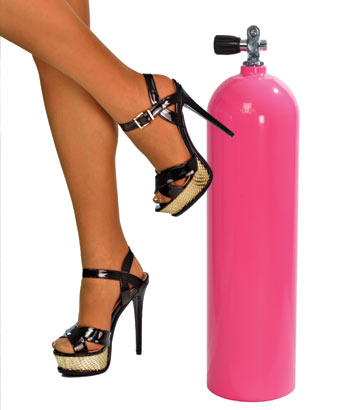 Pioneering Scuba diver Marjorie Bank never made it to my age. She died prematurely, the result of a massive heart attack. As a younger diver, I was inspired by her career and charisma. She was a prolific speaker at conferences such as Our World Underwater in Chicago. Marjorie would share her photography and stories from trips filming sharks, and hanging out with the Grateful Dead’s Jerry Garcia. She was never afraid to speak her mind, and as a shy young diving professional, I took note of her assertiveness. After seeing a dozen of her talks, I finally summoned the confidence to ask her for advice. She pulled me close and pinned a button to my shirt. Looking me in the eye she said, “Be confident in your dreams and know that you can do anything you want in the diving industry.” I was overwhelmed by this and with a smile on my face, I thanked her, noticing that the button she’d pinned on me read ‘No Bimbos’.
Pioneering Scuba diver Marjorie Bank never made it to my age. She died prematurely, the result of a massive heart attack. As a younger diver, I was inspired by her career and charisma. She was a prolific speaker at conferences such as Our World Underwater in Chicago. Marjorie would share her photography and stories from trips filming sharks, and hanging out with the Grateful Dead’s Jerry Garcia. She was never afraid to speak her mind, and as a shy young diving professional, I took note of her assertiveness. After seeing a dozen of her talks, I finally summoned the confidence to ask her for advice. She pulled me close and pinned a button to my shirt. Looking me in the eye she said, “Be confident in your dreams and know that you can do anything you want in the diving industry.” I was overwhelmed by this and with a smile on my face, I thanked her, noticing that the button she’d pinned on me read ‘No Bimbos’.
Marjorie let the world know that she was sick and tired of trade show babes-in-lycra using sexuality to sell the sport of SCUBA diving. She was exhausted from being marginalized as a large woman in a man’s world. She wanted women of adventure and achievement to be recognized on their merit – not their appearance. She was calling out the diving industry on sexism.
Undoubtedly a hot button topic, because I received hundreds of replies and tens of thousands of views.
When asked to write this piece, I was torn. Though I have endless stories of the challenges I have faced forging a career in diving, I felt a bit squeamish about airing dirty laundry. I want to believe that things are improving and with that in mind, considered declining the assignment. I thought this is one to leave well enough alone. But the opportunity to educate was compelling and, in the end, I reasoned, my mission was to simply represent the facts and attempt to write an article that validated women’s issues, and also would be informative and enlightening for both sexes.
This is not about bashing men. It’s about celebrating women, and offering a possible template to a more gender inclusive future in our industry.
So what is sexism anyway?
The term sexism is credited to Pauline M. Leet when she used it in a speech at Franklin and Marshall College in 1965, comparing sexism to racism, suggesting that it was discrimination based on a person’s sex or gender. For two centuries or longer, gender stereotypes in North America emerged from our well-established patriarchal society, which expects men to be determined, athletic, strong, and brave, while women are presumed to be emotional, nurturing, tolerant and softhearted. Generally, the expectation is that a woman will be the primary caregiver at home making sacrifices through years of raising children. Those gender stereotypes sometimes lead to a discriminatory belief that one sex is superior to another, and in the extreme, it can foster harassment and sexual violence.
Caroline Bird wrote in 1968, “Sexism is judging people by their sex when sex doesn’t matter. Sexism is intended to rhyme with racism. Both have been used to keep the powers that be in power.”
More than 100 years after Elizabeth Cady Stanton launched the first women’s movement, a wider consciousness in the 1960s and 70s brought about new rights and roles for women. The 1964 United States Civil Rights Act included language giving women equal opportunity in the workplace. And Title IX in the Education Codes of 1972 directed the educational establishment to provide women equal access to higher education and organized amateur sports. Yet in the United States today, women still do not receive equal pay for equal work, and are less likely to be promoted. A figure of $0.78 for every $1.00 earned by a man is often volleyed around as the current rate paid women, yet the details and demographics are certainly more complicated.
Additionally, a 2009 study found that overweight women are held to a stricter physical benchmark than men, and in sports, that factor may be even more significant. The glass ceiling for women is heavily influenced by appearance standards.
Jen Hudak, one of the greatest female half-pipe skiers of all time, was rankled when on the eve of the Sochi Olympics, Freeskier Magazine chose to print an article featuring the ten most attractive competitive women skiers: “Just being a good athlete isn’t enough anymore. In order to be successful as a female athlete, you have to be strong and beautiful. You definitely see the objectification of women in the action sports industry throughout marketing and advertising.”
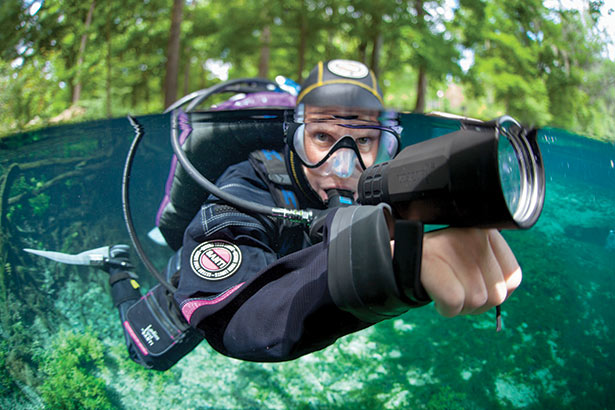
Sick of hearing women complain about unequal treatment? Tired of men saying there is no problem?
It’s tough to quantify the differences that women face specifically in sports, but an Impact Report for 2011/12, by the Women’s Sport & Fitness Foundation, found that women’s sport in the UK received only 0.5 percent of UK sports sponsorship and 5 percent of TV coverage.
A dive professional recounted to me that she was once told that she had received a gear sponsorship simply because she “had a vagina.”
In his article, ‘A Brief History of Sexism in TV Coverage of the Olympics’ in The Atlantic, Nolan Feeney writes, “In a country like the U.S., which provides no government support for Olympic athletes, sponsorships are a lifeline, but good luck securing them if you’re Sarah Robles. Dubbed ‘the strongest woman in America’, Robles was considered the U.S.’s best shot at winning a medal in Olympic weightlifting. “On her best day,” notes Buzzfeed, “She can lift more than 568 pounds (258kg) – that’s roughly five IKEA couches, 65 gallons of milk, or one large adult male lion.”
Yet prior to coming to the Games, she was living on a budget of $400 a month. “You can get that sponsorship if you’re a super-built guy or a girl who looks good in a bikini. But not if you’re a girl who’s built like a guy,” she told Buzzfeed.
Kay and Laberge mention that in Adventure Racing, women are valued for “teaming” skills. However, they are also “mandatory equipment” on mixed gender teams. On the one hand, they describe women as important team members, and on the other, they require minimum female participation, inferring that the team is only as good as the weakest link.
Change is slow in scuba diving
The good news is that women are slowly breaking down the doors to fully participate in action sports. They are challenging the masculine tradition, and demanding equal treatment and equal opportunity.
But diving is a different beast and despite the welcome inroads made in other arenas, change is slower in our sport. Though the likelihood of injury is low in scuba diving, it’s still viewed as risky, and men dominate risk sports. The ‘whiff of death’ hangs over scuba, and in particular, technical diving. Nobody wants to see a woman get hurt or killed.
Our diving culture emerged from, and was heavily influenced by, the male-dominated military. We speak nostalgically of Lloyd Bridges, Navy Frogmen and Captain Jacques Cousteau – yet rarely mention Zale Parry, the heroine of Sea Hunt fame, and one of the first women to engage in technical diving.
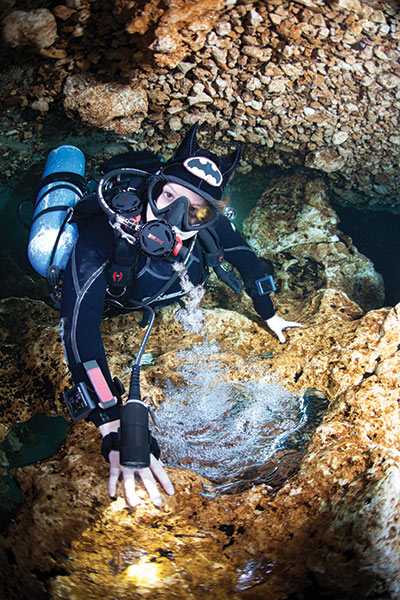
To gather community opinions about women’s issues in diving, I turned to the fabulously scientific Internet diving forums. I started threads entitled “Sexism?” on numerous social platforms. I tried to balance my request by asking the following:
“A major diving publication has asked me to write an article on sexism in diving. I’m curious how that makes people feel? Do we still have an issue with sexism in our industry? Are you sick of hearing women complain about unequal treatment? Are you tired of men saying there is no problem? Are there some reasonable suggestions to help women feel validated and men feel informed?”
It was, undoubtedly, a hot button topic, because I received hundreds of replies and tens of thousands of views. One of the first responses hit me square in the teeth. The reader had perused my professional website (IntoThePlanet.com), and declared that my resume was boastful and inflated. The reader said my mention of being honoured as a member of the inaugural class of The Women Divers Hall of Fame and receiving various Lifetime Achievement Awards was evidence that I was “full of myself.” This male diver wrote:
“I don’t want to be insulting but once again, I think there is an agenda here…. there are others on Scubaboard (I am not one of them) who have similar CVs and credentials and are a lot more modest about it. It plays straight into an allergy I have. I used to work in a consultancy where every single employee thought they were a ‘thought leader’, which just meant that there were a bunch of people running around acting all opinionated and full of themselves without really adding anything of value to important debates.”
I wondered: if the same earned credentials from my resume had been attached to a male persona, would this poster have written the same comments? If there was one thing I learned from Marjorie Bank it was to stand up and be proud of my accomplishments and hard earned credentials. So, I brushed these comments off but not without first noting that the male poster had responded to my inquiry in a ‘women only’ thread on an Internet forum. Another reader saw that too, commenting, “I’ve noticed over my years on SB that if you want to be sure of a male perspective, post it in the Women’s Forum.”
Other participants felt that sexism in diving is nothing more than a microcosm of what we experience in society more widely. A PADI Course Director and active technical diver said, “Sure, sexism is there… but I’m not sure it’s special to the diving environment. That is, I don’t think the non-sexist person suddenly changes stripes when they put on a wetsuit, or vice-versa. There are just more opportunities for it to arise in the diving environment… heavy equipment to be moved around, swim suits; lots of opportunities to show off ‘superior’ knowledge, skills, and strength.”
A noted physician and very active diver took it one step further saying, “I think it takes two to be sexist. First, you have to have the man with the attitude, and then you have to have the woman with the chip on her shoulder. I have never carried that chip, and it takes fairly egregious behavior to register as sexist to me.”
A male poster from the cave diving community felt there was no sexism at all. He said, “Seems to me like, at least in cave diving, we criticize folks – men and women – using the same criteria: are you a clean diver? Slow? Complain a lot? Whine? To be completely honest, I’ve seen more men throw emotional fits than women.”
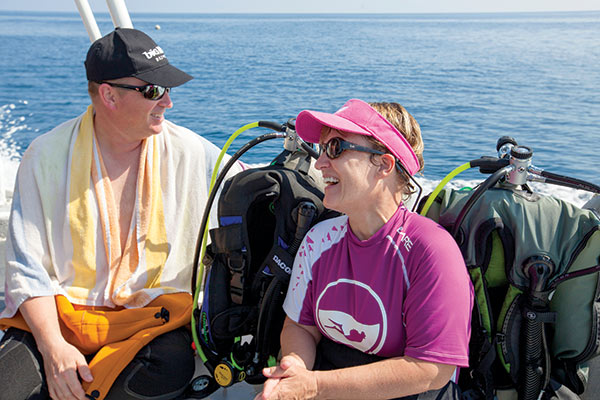
But as private messages landed in my inbox, another reality unfolded. The pithy stories that broke my heart were mostly off-the-record. Some wrote tomes while I volleyed back my encouragement and support. Others met me for lunch or beyond earshot at a local dive site. Real stories of harassment, discrimination and egregious, even criminal behaviors, were described. But, as one woman put it, the behavior was tolerated because she didn’t want to be labeled as a diving “Femi-Nazi.” (A derogatory term for strong, committed women popularized by Conservative radio host Rush Limbaugh.)
Why anyone would buy a piece of dive gear just because there’s a half naked girl in an ad..?
I listened to complaints of women being held back in training and career advancement, feeling invisible, and given the silent treatment at dive shops. And, there were a few who nervously shared accounts of overt intimidation by male divers, boat captains and storeowners. I listened to stories of sexual groping by male peers and general workplace harassment, a pattern made even more intolerable by lack of professional opportunities and severe pay inequality. The stories were visceral and some of these women had never openly shared these truths. They wanted the information broadcasted to the diving community, but they did not want to be identified as an informant. A competent, skilled young woman said this to me. “One of the most difficult incidents I experienced was when I worked for a dive center in Florida. A new employee was promoted ahead of me. I had been with the organization for almost three years and a dive master employed there less than three months (I even assisted with his dive master course) was moved up to manager of the facility. The storeowner sat me down and explained how ‘girls aren’t successful in this industry’ and that ‘it’s a boys club’. He even went so far as to tell me that, ‘no matter how hard I work, it just won’t happen’. He said I might have a little chance in the industry if I moved to the Caribbean. I was considered a bitch if I stood up for myself or I was being ‘too sensitive’. I worked twice as hard to not even be considered equal. I filled tanks, carried tanks, unloaded gear and prepped the boats. I was the second highest rated instructor at the store, an equipment technician and even had a Master’s degree, yet I was the lowest paid employee and never considered an equal.”
Weighing the totality of all the accounts, posts and phone interviews, I discovered a community divided. I struggled with the direction for my article and in the end decided to share the perspectives from both sides of the fence, hoping that my readers could appreciate the viewpoints and perhaps imagine themselves in somebody else’s shoes.
The Educational Setting
Many anecdotes revolved around ‘first contact’ within the sport of scuba diving: the Open Water Diver class. Experiences were wide-ranging for observers, practitioners of discrimination, and victims. From a private message, a male reader who had experienced reverse discrimination wrote:
“I have observed clear sexism. The females are always walked gingerly through lessons while it appears that the instructors assume the males just get it right away. On boat trips, everyone is careful to watch over the female divers, often going out of their way to extend some courtesy to help the poor female with the big heavy equipment, or the slippery deck, when boys with less strength are not helped, and sometimes even teased or chastised when they struggled.”
But a busy Florida dive shop instructor and captain wanted to point out challenges he faced trying to teach a mix-gender class. “I routinely had more men than women in my open water certification classes. The men always wanted to assist the female students in the class, in any way possible. This would be especially bad when couples took the class together. On numerous occasions I had to prevent doting husbands or possible suitors from setting up dive equipment for the female students in the class… Some of the women in my classes would take advantage of this and have nearly everything done by the male student of her choosing. Obviously this was stopped so that everyone met the performance requirements of the course. It made for some awkward conversations.”
This writer saw a different dynamic at the leadership levels of training. “Dive master and instructor level training was a whole other ball game. The roles were somehow reversed from the get-go. It seemed that the ladies had something to prove by the time they got to the professional level, and would train intensely. I never encountered the ‘oh I’m just a helpless woman, please do everything for me’ attitude at these levels. The men in the class always hated to be out performed by the female students, and they were intensely aware of it when it occurred. Sometimes it would motivate the male students to do a bit better, other times I had to put an end to sexist remarks.”
Feminism is not trying to rewrite history, but instead chart a course for a more equitable future
The student’s viewpoint was sometimes eye opening, observing unprofessional behavior of instructors or dive masters. “I cannot tell you how many times an instructor is completely distracted (to say it nicely) by a pretty diver/student. In my OW course there was a petite pretty blond and she got three times the attention than any other student. The instructor went as far as trying to get her to take her wet suit off on the pool deck instead of in the locker room. It was bad. Needless to say it was the last time I trained with that instructor.”
Another poster was quick to point out the lack of leadership roles filled by women in cave and technical diving. He noted that the National Association of Cave Divers (NACD) listed 41 instructors that are all male. The National Speleological Society Cave Diving Section (NSS-CDS) had just five females in a list of 51 instructors. He looked at the TDI website and noted that six of 36 instructors in Florida are female. Global Underwater Explorers (GUE) does not have a female cave instructor in its ranks at time of writing. These statistics are by no means complete or fully researched, but they left me wondering why there are so few women in leadership in these technical organizations.
At the recreational diving level, DEMA reports that 35 percent of open water divers are women and that 23 percent of continuing education students are women.
In leadership, the Professional Association of Diving Instructors (PADI) reports that there are currently over 25,000 women who are members at the Divemaster level and above. The reality is that less than 20 percent of PADI professionals are women. At the Master Instructor level, the news is even worse. Only 13 per cent of PADI Master Instructors are women. According to Senior Business Analyst Sue Porter, the statistics and percentages have remained stable over the last three years. The attrition rate from entry level diving to leadership is remarkably high worldwide.
I recall an early exchange on one of the first technical diving forums. A poster asked, “How many women are certified as both cave divers and trimix divers?” Being one of those few, I watched the thread with interest. A response came back, “five.” Another poster followed, correcting this with the names of the seven of us who held both certifications. Then a remarkable response came in, “1678,” or some other ridiculously large number for the era. The reply from the previous poster was to the point and not without humor, “Dude, do you have their phone numbers?”
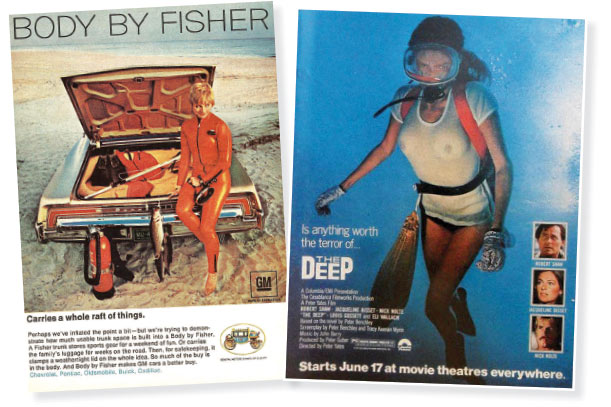
All Dressed and Ready to Go
There is a certain amount of conspicuous sexuality in scuba simply based on the equipment and clothing that we wear. The promotional material for the Hollywood hit, The Deep, released in 1977, featured the female star, Jacqueline Bisset, in a wet T-shirt, and scuba diving marketers seized on her seductiveness. The earliest diving equipment catalogs depicted brave hardhat divers exploring the ocean while sexy, bikini-clad women water-skied above them. Over the years, the industry has trended slowly towards more gender-friendly marketing, but there has been plenty of skin. A reader from the Northeast diving community posted, “I see a lot of ‘attractive’ people in diving ads. But there’s a significant amount more overt sexuality associated with the women models.”
Another writer was far more upset in her perception of equipment marketing with this comment.
“Why anyone would buy a piece of dive gear just because there’s a half naked girl in an ad staring at you like she’s just had a lobotomy (which I guess is supposed to be the sexy seduction look), has never made any sense to me.”
Other sports have chosen a markedly different route. The millennial participants in snowboarding embrace loose and baggy clothing in an open attempt to disguise sexuality and gender identity. Participants say they want to emphasize the skill of the boarder, not the perceived attractiveness and appearance of the athlete.
But another reader offered the wisdom that market research drives advertising. We might be getting exactly what we are asking for. “I’m fairly accustomed to running with the guys. Pinups don’t bother me. The restaurant Hooters doesn’t bother me (although Wing House has friendlier waitresses and better wings). ‘Attractive’ sells, whether it’s attractive women, cars, men or puppies. It’s just a fact of life in advertising. That said, the most attractive people, male or female, are those who smile from the inside, are kind, are self-confident, and aren’t afraid of soap.”
The single greatest number of complaints I received came from women who said the industry did not offer the correct, comfortable fit, or type of gear they desired. Women often noted that they felt like manufacturers saw them as an afterthought. (We used to call it the SAP Principal in the 1990s. Take a piece of men’s equipment, make it “Small And Pink” and you have the SAP Principal in action.)

This is a sport where an adventure shared can create a lifelong bond, regardless of age or gender
Recently NATO commissioned an extensive study comparing the body proportions of men and women from North America, The Netherlands, and Italy for the purpose of designing safety apparel for military personnel. The results of their work demonstrated a strong separation between men and women, and determined that scaled-down equipment did not adequately meet the needs of women. Rather, it actually created safety issues that could jeopardize military operations. Just looking at hip size alone, they realized that the design of flight, cold water immersion, and anti-g suits needed to be specifically redesigned to fit women.
Women have a lower center of gravity. They have shorter torsos, longer legs, shorter lower legs, smaller waists and wider hips. Women’s feet are different. They have lower volume heels, lower anklebones, and higher arches. Men have longer torsos and a lot of weight in their chests. If you find a man and woman of equal height and place them side by side, it is likely that her legs will be longer than his – and his torso will be longer than hers. Or, if you find a man who is a little taller than a woman, you will likely find that their legs will be of equal length.
Women’s shoulders are generally narrower and slope downward from the neck. Shoulder straps need to be shorter for women, contoured and narrower since their waistline is higher than a man’s. Their necks are smaller too, and obviously, they have breasts that need to be accommodated into a design. A woman will rarely be happy wearing men’s gear in “girly” colors.
Fortunately, the availability and selection of dive gear made expressly for women is on the rise. Dive shops that cater to women with gear made expressly for them, will be rewarded with customer loyalty. Those that don’t will simply not get their business.
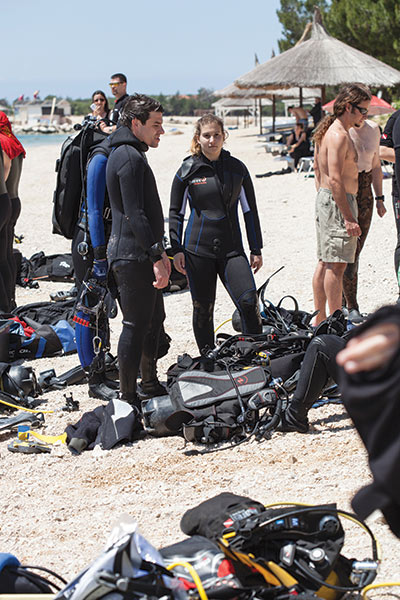
At The Dive Site
Both men and women related stories of how women are pre-judged to be diving novices regardless of their certification or skill level. Recently, I was teaching a photo intern when his dive buddy came up to say hello. After the greeting, he turned to me and asked if I was diving or just hanging around. Before I could reply, he invited me to join him for an easy dive in Ginnie’s Cavern –where he would “take good care of me.” I let it go. My student’s face reflected acute embarrassment.
A male reader shared a similar story, which I’ve often seen played out in North Florida. He said, “I was gearing up, along with about 15 other divers, among them a single female, and watched the person in charge bypass every single male diver and walk straight to the woman in the group to ask for her credentials and experience. Aside from coddling (enquiring whether she needed help to carry her scooter down to the water) he asked if she needed a buddy or any pointers on how to get around the flow.”
Some women described how they felt unwelcome at particular dive sites and on certain charter boats. They felt there was an immediate assumption that they were less skilled than their male counterparts. As a result, they felt they were under greater surveillance in general, and were more likely to end up as the subject of somebody’s Internet rant. Men often suggested these stories were not about gender, but rather about capability. Men said that “nobody wants to buddy up with a lesser diver”, who might limit their own experience in the water. Women countered, saying this argument was an excuse and maintained they are equally capable of participation.
I recall an exchange I had checking in for a dive charter. The man beside me said, “Oh, you’re going on the tech boat with those guys? They do those long dives, don’t they? Do you get bored waiting for them or just enjoy sunning while you wait?” I smiled. It was an easy enough mistake. He meant no harm, truly. I was saved from answering as we both got called up next. Standing beside him signing in, I opened my c-card book on the counter and pondered aloud “Hmmmm, should I use my Trimix Instructor card or my Cave Instructor card?”
Another woman brushed off unwanted attention, “At first I was kind of taken aback by the number of times I got hit on, but then I realized diving isn’t unlike any other co-ed sport. It’s human nature. People are going to flirt with each other and think that they need to help ‘the weaker sex’. As long as everything is kept respectful on all sides there is nothing wrong with having a little clean fun now and then.”
A pioneering woman Navy diver had a very different experience. There were times that she wished she had some attention or support from her male comrades. She was training to become a Navy diver when she very nearly flunked out of the program.
“We had to go down the ladder, do a project, then climb back up the ladder to the deck. I was having trouble climbing back up the ladder. I failed twice. I thought it was because I was not strong enough to pull myself up. The instructors told me that I had one more chance to make it before I was kicked out. One of the officer supervisors pulled me aside and told me that I was bringing my legs up high enough, but was missing the ladder rungs, going outside of them instead of hitting them. The ladder was only about 12 inches wide and they were easy to miss with the Mk V helmet on since you couldn’t look down to see where your feet were. He suggested I try to pigeon-toe my way up. So the next time I was in the tank, I did what he suggested and made it up the ladder no problem. I had to wonder why no one else made that suggestion before my two failures.”
After her success in dive school she found the command climate to be equitable; once she’d passed dive school, she felt respected by her peers and her command.
This is a sport where an adventure shared can create a lifelong bond, regardless of age or gender.
A Florida charter captain said he liked to include women staff on his boat. “As a captain I always made better tips when I had a female Dive master (DM) on the boat. No exceptions. If everything went well this DM got great tips. Some of the gratuities came from other women who would say things like, ‘It’s nice to see a competent woman guiding dives’. If the shit hit the fan for any number of reasons we would still make great tips. Maybe the mostly male clientele thought, ‘she’s a woman and she’s trying’. I’m not sure, but I can tell you that when the customer service was lacking with a male DM on the boat the tips would suck, and the male customers wouldn’t hesitate to call him out. Not so with female DMs. It seems there would be some sympathy for a female DM, even if she was doing a bad job.”
A woman boat captain and professional diver in the Caribbean told me, “When I used to drive the boats in, people would clap their hands if I docked in one smooth maneuver, yet if a guy did this it was considered average, routine.”
A Northeast wreck diver intentionally sought out mixed gender charter opportunities, saying, “On the dive boats in New Jersey there are lots of women divers. I’m sure sexism is alive and well aboard these vessels, but for the most part I’ve seen very capable women divers ‘holding their own’, and male divers treating them with respect and as equals. I do notice a little less trash talk when there are ladies on-board.”
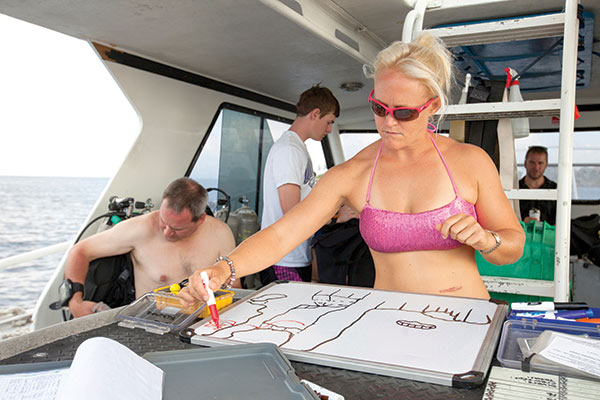
Strategies
For women trying to find a gender-neutral diving context, there are some strategies that were offered. Women frequently seek out advice on ‘women-friendly’ operations and boats. They search for guidance on selecting appropriate instructors and sometimes specifically seek out other women as mentors and teachers. Women choose to avoid certain operations, instructors, and notorious shops, rather than face discrimination or harassment. A self-described male ‘senior diver’ said, “Some women may get into diving because they are a wife, daughter or friend of a diver. There seems to be full and immediate acceptance of a girl or woman brought to a dive shop for training by the man in their life. However, I have observed on more than one occasion that when a professional independent woman visits a shop she finds the shop staff ‘cold’ to the idea of taking her on as a student.”
Most women who described discriminatory dive operations said they would never return that business. They were unforgiving of this type of behavior.
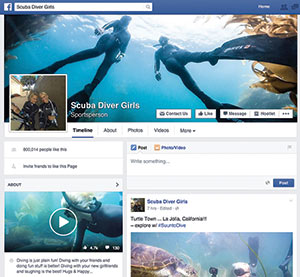
Many women on Internet forums sought out social, collective experiences such as women’s dive events and clubs. These activities are not just women only. They are organized around a completely different way of enjoying the sport. These types of activities tend to emphasize a supportive environment where a woman can expect equality and mentoring. At women’s events and dive days, opportunities are provided for women to support each other and discuss women-specific issues. Timid or socially uncomfortable women are encouraged to participate in these events, which are organized around common principles of recreation, fun and friendship. Organizations such as the Women Diver’s Hall of Fame unite accomplished women in a way that bonds them on common causes by creating scholarship and internship opportunities for women divers.
Some women found these events and clubs to be uninteresting or needless. Their coping strategy involves blending in and de-emphasizing gender. These women tend to reject the necessity for organizations such as the Women Diver’s Hall of Fame. They feel that their personal empowerment is achieved not by being a great ‘woman diver’ but by simply pushing themselves to be a ‘great diver’. These same people downplay their gender, rejecting colourful equipment that may emphasize their gender. Despite a sometimes diminutive size, these women carry tanks that are just as large as those carried by their male dive buddies, who dwarf them. They wear black gear and attempt to blend into a group.
Still others pursue a strategy that’s quite the opposite, wearing gear that highlights their femininity, such as pink or stylish equipment. They proudly display themselves as feminine, strong and capable women. A good example is a social group called Scuba Diver Girls. These active and experienced divers flat out reject the notion that women are less capable and instead emphasize their experiences in diving. In doing so they help change the image of women in diving.
A male diver/paramedic recounted, “I spent the 1980s crack epidemic as an urban paramedic in a ‘knife and gun club’ area, with a female partner for nine years. She was a great paramedic, and she would always tell new female EMS staff, “If you can do the job, you’ll get the respect, from the people whose respect is worth having. The people who don’t respect your ability to do the job aren’t people whose opinions you should be concerned about.
“My cave diving, retired detective wife used to tell new female police officers, ‘It’s not about your gender, it’s about your ability to do your job. There are people who will try to crap on you for being a woman in a ‘man’s job’, but if you’re easily upset or offended, perhaps this isn’t the right career for you. Just do your job, stand up for yourself, keep your sense of humor, and don’t sweat the small stuff. Most of the sexist stuff is just boys’ lame attempts to be funny. The problem is not ‘women in a man’s job’, it’s ‘boys in a grownup’s job’ – 30+ year olds whose level of maturity is stuck somewhere around middle school.”
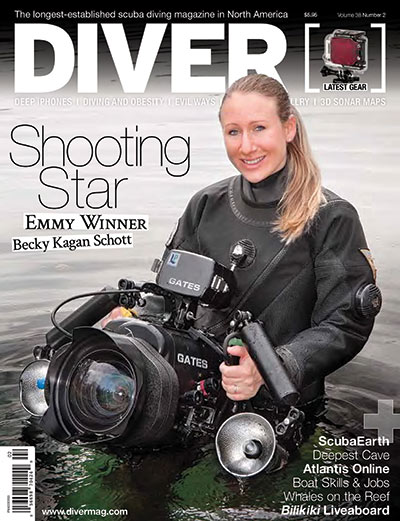
The Costs of Equality
On one diving forum thread, the conversation eventually came around to a long discussion about my deceased friend Agnes Milowka. A young and talented cave diver, she paid the ultimate price and perished in an Australian cave. In 2010, I had perhaps unknowingly foretold her death in my book The Essentials of Cave Diving, when I wrote:
“Agnes, a native Australian, begins her dive, stripped of all but a wetsuit, then digs her way into the crumbling passage. Her tiny, 110-pound frame is sustained by the tank she pushes ahead of her. She doesn’t know that countless divers have already given up on this squeeze. She doesn’t care that she’s trespassing on state property. She doesn’t even worry that if she has a bad day, her body won’t be recovered. She just presses on, exploring in a vacuum, moving ahead because nobody has stopped her. She’s made choices that few would make. The risks are her own, and perhaps, taken in the ‘invincibility of youth’. But despite taking risks some might call insane, she hits pay dirt and reveals another 8,500 feet (2,591m) of the mysterious conduits inside Mother Earth. Is it prudent? The community will undoubtedly judge her actions as either heroic or psychotic. Although reliable technology and tools have increased the range of modern cave divers, some things will never change. Wes Skiles’ unlikely protégé will agree that, “Nothing can beat the moment you unwind a reel into completely uncharted territory.”
In writing about Agnes, I was observing a shift in technical diving. Although it may have resulted in her untimely death, there were things that were coming to the surface that I felt were really positive. Younger divers seemed to be more gender blind. There was a welcome growing perception that women explorers were not less capable than men. There was no reason to sit in the bleachers when you could take the bull by the horns and blaze a trail. A writer asked, “Does anyone feel Agnes (an attractive female) was treated differently or encouraged differently than if a young male would have been doing the same level of dives at the same age/experience level?”
A pioneering cave diver responded, indicating that Milowka had truly reached gender equality, “The sad fact of life is, Agnes died because she was out to prove she could do anything men could do. Well, she did, she died trying to prove something, like a lot of guys have done in the past.”
In the end, we need to be open-minded in our understanding of sexism. Men have ruled the planet for the past five million years. Feminism is not trying to rewrite history, but instead chart a course for a more equitable future. The mainstream women’s movement seeks to acknowledge the real differences between men and women while balancing power equitably. Women’s rights activists ask us to use feminist nomenclature that supports that cause.
To this end, our community can embrace some simple social manners:
Try to view all your fellow divers without pre-judging their capabilities. Quite simply, avoid making assumptions. Don’t conclude that women are tag-alongs. Err on the side of positivity. Assume all divers are capable, equal members of the dive team until personal observation tells you otherwise. Avoid offensive comments and sexual remarks about your fellow divers. Whether you have made an off-colour remark in person or on social media, remember that we all live in an increasingly pubic world. Anything you say will likely come back to you at some time in life.
Above all, don’t be afraid to call out bad behavior. It might provide an educational opportunity for some and empowerment for others. Co-author of my book, Women Underwater, Renee Power, shared a personal story that really spoke to me. Although she is an incredibly strong and capable explorer and educator, she was a little nervous about speaking up. She shared a moment in an IDC Staff Instructor update that was a watershed moment for many participants.
“During one session, a Staff Instructor was presenting ‘Low Pressure Hose Disconnect/Connect’ to the group… At the end of debriefing, he said something like, ‘This can be a little difficult to do especially for you women.’ James Morgan, PADI Vice President, our group leader, thanked him for his presentation and asked for feedback before he dismissed us.
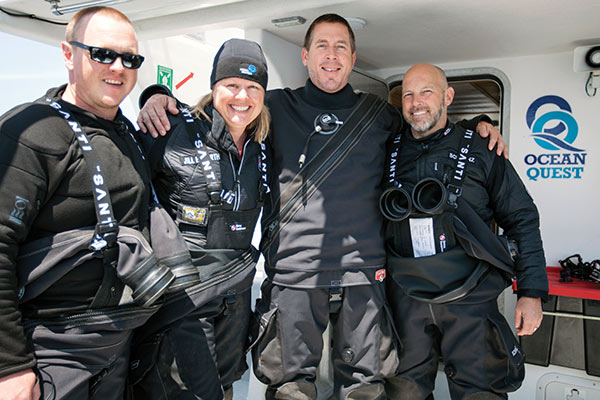
“Immediately I felt something happen inside. There was little time to process let alone respond. And respond how?? I began to examine my feelings and was quickly able to ‘name’ them. Should I speak up to James Morgan and all the other Staff Instructors who were towering above me in the shallow end of the pool? Would they think I was being sexist or a man hater? Would they think I was weak? Would they completely dismiss my words? My feelings? I cautiously raised my hand hoping James wouldn’t see it. He did and all eyes were looking down at me…
“Please be mindful of your audience.” I began. “When you indicated that women especially would have trouble with this I immediately felt weak and not capable of success with this skill or any other. It’s not a strength skill – it is one of technique. Set your students up with success instead of implying failure. They will perform how they are set up to.”
Morgan did not just thank her for her feedback but applauded her enlightened comments. It was a good learning situation for everyone involved. Sexism is not always intentional. Sometimes people don’t even realize what they have said or how it might make someone feel. With gentle correction and an open mind we can all improve gender-biased language to make it more inclusive and as Power indicates, uplift people to perform their very best.
After a fair and balanced review of 2015 diving equipment catalogs compared to those produced by the same companies in Marjorie Bank’s time in the 1990s, I discovered that while I still feel women are objectified and sexualized in many diving advertisements, there has been an enormous improvement. More often I found that manufacturers were trying to strike a balance. Diving can be sexy without being sexualized. The very act of breathing underwater is exciting. Travel, adventure and exotic destinations are stimulating. Observing rare and endangered species is a privilege few will ever experience. Exploring remote wrecks and inner space is simply exhilarating.
The button Marjorie Bank pinned on my shirt has long been discarded, but her legacy remains.
Let’s celebrate the individuals in our community for excellence. Let’s enjoy travel and underwater experiences in a way that lifts all participants. If we wanted to be highly competitive, we would have picked another sport. This is a sport where an adventure shared can create a lifelong bond, regardless of age or gender.
We are all fortunate to venture where few women or men have ever been.
What do you think? Tell us your opinions below…







